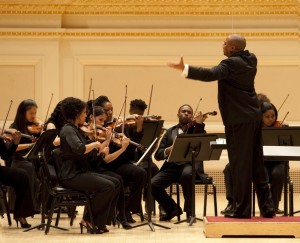
Sphinx Organization’s work sees Miami in September, October
Last September, the New World Symphony presented the world premiere of “Dancers, Dreamers and Presidents,” a symphonic work by Daniel Bernard Roumain inspired by the rise of Barack Obama. The work was commissioned by Detroit’s Sphinx Organization, a Knight Arts grantee which works to increase the involvement of African-Americans and Latinos in classical music. This coming October, the New World will offer another Sphinx world premiere, a work called “Sukkot Through Orion’s Nebula,” by James Lee III, who teaches composition at Morgan State University in Baltimore. In a program note, the composer describes it as “a festive work for orchestra” that comments on the arrival of the Messiah, descending through the stars along with the New Jerusalem.
The New World is one of the Sphinx group’s artistic partners, and that partnership will be further explored in September when the Sphinx Virtuosi, the organization’s touring string orchestra, comes to the New World Center on Miami Beach for a concert Sept. 21.
Here they are on YouTube, playing the third movement of the Sinfonietta by Coleridge-Taylor Perkinson, a Chicago-based composer, pianist and arranger who died in 2004. This is a piece very much in the tradition of American tonal modernism, and it’s well-crafted and exciting. This performance, recorded at Central Michigan University, introduces us to a crackerjack string ensemble that handles Perkinson’s tricky rhythms with style and airtight unity.
Perkinson’s music is scheduled to be part of the tour, as is that of Michael Abels, whose “Delights and Dances” can be heard here in a performance from 2009 with the Sphinx Virtuosi (then called Sphinx Chamber Orchestra) and the Harlem Quartet. That quartet released a good disc (“Take the A Train”) about three years ago of music by Duke Ellington and Wynton Marsalis.
The United States’ shameful history of racism has made it necessary for groups such as the Sphinx Organization to provide the opportunities that traditional institutions might not be able to give to members of the African-American and Latino communities. Sphinx was founded in 1996 by musicians Aaron Dworkin and Carrie Chester, and in its 15 years it says it has reached 85,000 students and 250,000 audience members, provided $300,000 in orchestral instruments to minority musicians and awarded nearly $2 million in scholarships.
That’s a fine record for an organization with such a brief history, and the idea that it has to exist also underlines the United States’ odd attitude to government support for the arts. Politicians find it an easy target for mockery, and there’s a cultural begrudging of public money for artistic expression that’s intellectually incongruous given that this is a country in which almost all of our daily experience is mediated through the arts — television, film, video games, songs and even news broadcasts.
To see more of the Sphinx Organization’s work is surely a good thing, and September and October will provide Miami audiences with a double dose of art brought into being by a group for whom inclusion is a watchword, a way of life and a mirror up to our multicultural musical society as it really is.
Recent Content
-
Artsarticle ·
-
Artsarticle ·
-
Artsarticle ·

